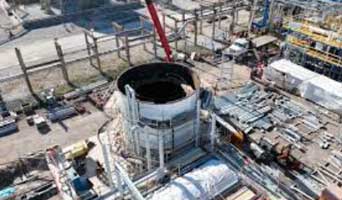Green Expansions: CJ HDC opens South Korean bioplastic compounding plant; Origin Materials completes Canadian biobased materials plant

CJ HDC biosol and CJ Biomaterials, a division of South Korea-based CJ CheilJedang and a primary producer of polyhydroxyalkanoate (PHA), will work together to accelerate the development and commercialisation of ecofriendly bioplastics. Biosol has completed construction of a new South Korean bioplastic compounding plant in Jincheon, Chungcheongbuk-do, which has capacity to produce 11,000 tonnes/year of bioplastics. Biosol, established in February 2022, is the result of the joint venture between CJ CheilJedang and HDC Hyundai EP, South Korea’s largest plastic compounding manufacturer.
Compounding is a process of mixing or blending polymers and additives together to create a customised plastic solution to meet specific colour, property and performance requirements. Biosol’s new facility will focus on developing sustainable solutions using a variety of biopolymers, such as CJ Biomaterials’ amorphous PHA, cellulose, polylactic acid (PLA) and others. CJ Biomaterials is A producer of amorphous PHA, which is a softer, more rubbery version of PHA that offers fundamentally different performance characteristics than crystalline or semi-crystalline forms of PHA and is a very good modifier for other bioplastics. It has strong biodegradability and compostability properties and can contribute to marine or soil biodegradable, or home compostable products in a variety of applications.
biosol has started production at its approximately 40,000 sq-ft compounding facility that will allow CJ CheilJedang to expand its business area to encompass more eco-friendly materials beyond its PHA technology, while HDC Hyundai EP is expected to further consolidate its position as South Korea’s leading compounding business.
“Global customers are setting aggressive environmental, social and governance goals, focusing on sustainable management amid the rising trend toward carbon neutrality,” said CJ CheilJedang CEO Choi Eun Seok, at a ribbon cutting officially opening the Jincheon site. “We are committed to devoting resources to support biosol and the goals of the joint venture to become a leading eco-friendly material solutions company by providing our differentiated PHA material to combine with the cutting-edge compounding capabilities of HDC Hyundai EP.”

In other news, Origin Materials, a US-based carbon negative materials company, has announced the mechanical completion of Origin 1, the company’s first commercial manufacturing plant, located in Sarnia, Ontario, Canada, to produce sustainable materials including chloromethylfurfural (CMF), which can subsequently be converted into high-performance products used in packaging, textiles, apparel, automotive, as well as hydrothermal carbon (HTC).
As part of mechanical completion, the plant's critical mechanical systems have been successfully installed and commissioning has begun. Work onsite will continue, including electrical work, adding new equipment, and further refining technology.
“The mechanical completion of Origin 1, our first commercial plant, is an important milestone in our mission to enable the world’s transition to sustainable materials,” said John Bissell, Co-Founder/Co-CEO of Origin Materials.
Work at the plant continues following this key achievement, with plant commissioning to support start-up anticipated to be complete around the end of Q1 2023 and start-up beginning shortly thereafter. Origin 1 is expected to start to address growing customer demand for the company’s renewable materials and allow customers to qualify products and applications beyond PET. The company expects to provide guidance on revenue, EBITDA, and other financial metrics for full year 2023 on its next earnings call.
This commercial-scale plant is anticipated to produce sustainable materials including chloromethylfurfural (CMF), which can subsequently be converted into high-performance products used in packaging, textiles, apparel, automotive, and other applications, as well as hydrothermal carbon (HTC). HTC can be used in fuel pellets, as activated carbon, and as a replacement for carbon black.
Origin’s patented technology platform can turn the carbon found in sustainable wood residues into useful materials while capturing carbon in the process. The plant is expected to be able to convert an estimated 25,000 tonnes/year of biomass into products for a wide range of end markets.
(PRA)
Subscribe to Get the Latest Updates from PRA Please click here
©2023 Plastics and Rubber Asia. All rights reserved.

©2023 Plastics and Rubber Asia. All rights reserved.
Home Terms & Conditions Privacy Policy Webmail Site Map About Us






















